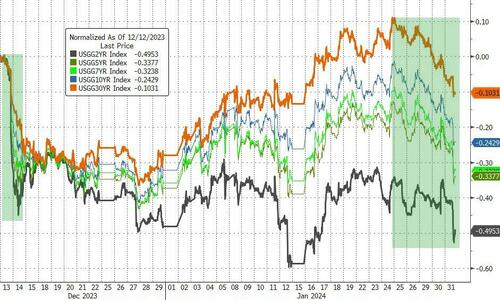

The Federal Open Market Committee (FOMC) meeting in January projected a surprising hawkish stance, especially in light of the previous December meeting, which signaled a more dovish approach. This shift in tone has significant implications for the market and future monetary policy.
The Federal Open Market Committee (FOMC) meeting in January projected a surprising hawkish stance, especially in light of the previous December meeting, which signaled a more dovish approach. This shift in tone has significant implications for the market and future monetary policy.
The December FOMC meeting had indicated a potential pause in rate hikes, with market participants expecting an upcoming rate cut cycle. This was based on economic data suggesting a "soft landing" scenario: GDP growing above trend, low unemployment, and the Fed's preferred inflation measure, core PCE, maintaining at a steady 2% for six months.
In contrast to expectations, the January FOMC meeting took a hawkish turn. Chair Powell explicitly dismissed the likelihood of a rate cut in March, emphasizing a data-dependent, meeting-by-meeting approach. Despite acknowledging favorable data, Powell called for more evidence of sustained inflation control before considering a rate easing cycle, wary of premature easing potentially reigniting inflation reminiscent of the 1970s.
The unequivocal rejection of a March rate cut led to a hawkish interpretation by the market, with an immediate response seen in a sell-off in stocks and a rise in interest rates along the yield curve.

A less apparent hawkish signal emerged from the discussions on quantitative tightening. The minutes indicated talks of tapering the balance sheet reduction, yet Powell clarified that a substantial conversation on this topic will occur in March. This suggests that QT tapering may not commence until Q4 of this year, contrary to some market expectations of an earlier start.
Looking ahead, the March FOMC meeting is anticipated to be pivotal. It may reveal a shift in the Fed's dot plot towards additional rate cuts, reflecting the faster-than-anticipated decline in inflation. Moreover, the meeting will likely provide clarity on the approach to quantitative tightening, with further information expected in the subsequent press conference or the March FOMC meeting minutes.
The January FOMC meeting has set a hawkish tone for the near-term monetary policy direction. Chair Powell's remarks indicate a cautious approach to rate adjustments and balance sheet policies, with the March meeting poised to offer further insights into the Federal Reserve's strategy in navigating the current economic landscape.







